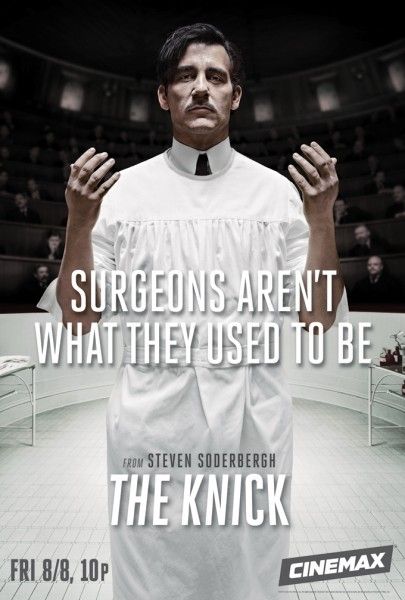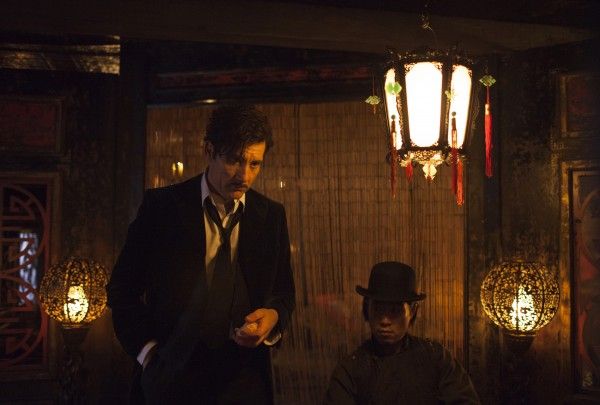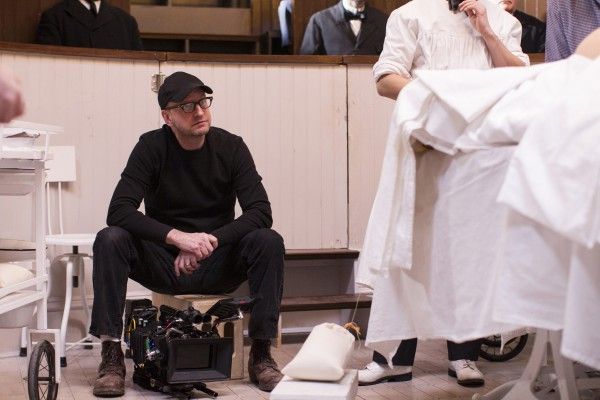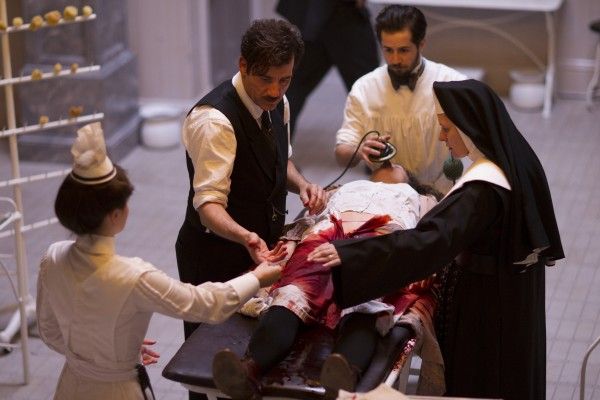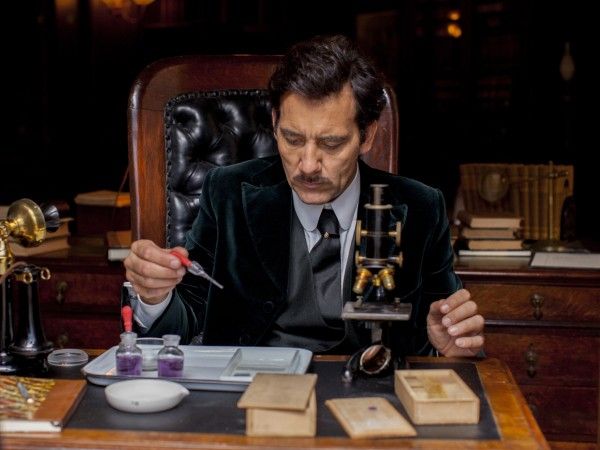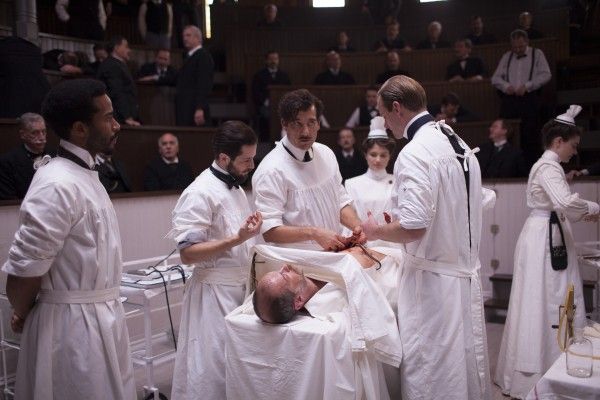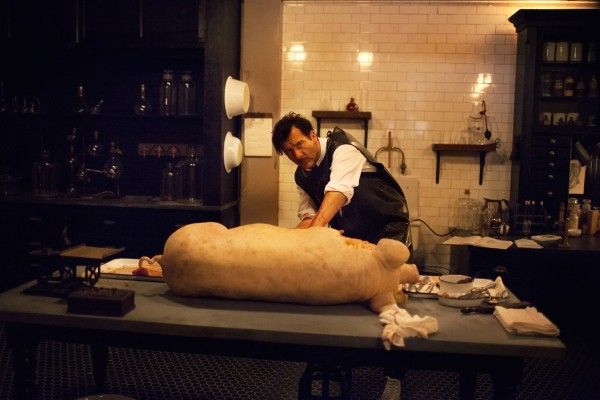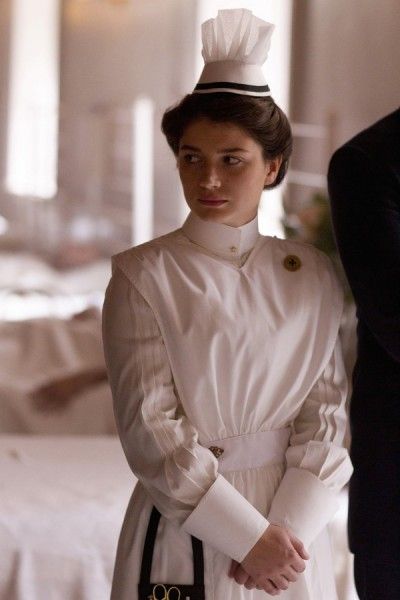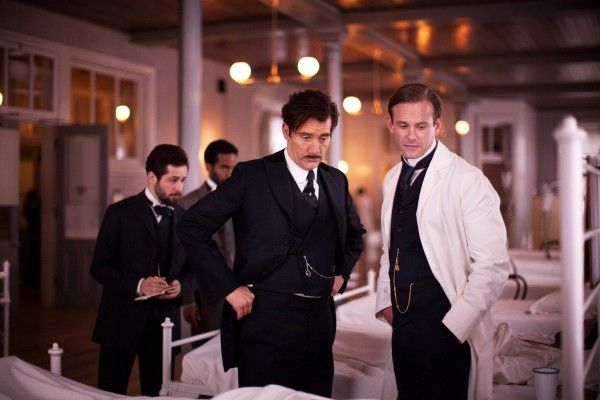Created by Jack Amiel and Michael Begler and directed by Steven Soderbergh, the Cinemax drama series The Knick showcases The Knickerbocker Hospital in New York City in 1900, when it was the home to groundbreaking surgeons, nurses and stuff who pushed the boundaries of medicine in a time of high mortality rates and no antibiotics. Equal parts brilliant and arrogant, Dr. John Thackery (Clive Owen) is the newly appointed leader of the surgery staff, but his own ambition for medical discovery is almost overshadowed by his addiction to cocaine and opium. While addressing issues of race, sex and class, the show will undoubtedly make viewers grateful for how far we’ve come.
During this recent exclusive interview with Collider, executive producers/writers Jack Amiel and Michael Begler talked about what led to the creation of this show, how this was a period of massive transition in America, how Steven Soderbergh ended up being the first person to read the finished script, how quickly Soderbergh moved ahead on the project, once he signed on, their desire to have all of the scripts for the 10 episodes written ahead of time, so that they could film out of order when needed, getting such a terrific cast of actors together, and having the show mapped out, scene by scene, so that they could move right ahead on a second season (which has already been picked up). Check out what they had to say after the jump, and be aware that there are some spoilers.
Collider: How did this show come about?
MICHAEL BEGLER: It started with my bad gut. A couple of years ago, I was having a health issue and I was going down the road of different treatments, both traditional and alternative. At points, I was just really amazed by what medical science had figured out, and at times, I was extremely frustrated about what they hadn’t figured out yet. It just made me think about this idea of why we know what we know when we know it, and how would I have gone about this, over one hundred years ago? So, Jack and I just started talking about that, and about what it must have been like to work in that era. The guys, back then, were just as smart as the doctors today. They just didn’t have the hundred plus years of resources that we have.
JACK AMIEL: Doctors today are smart because somebody had to figure it out, and these guys figured it out.
BEGLER: So, we were talking and we decided to buy some medical textbooks from 1900 off of eBay. We started reading them, and they were fascinating. They were like reading a great novel. We couldn’t put it down. We would email and text each other and be like, “You’ve gotta read this part!
AMIEL: “You’re not gonna believe what they did to people! Oh, my god, they’re barbarians!”
BEGLER: And then, once we started reading more about the era itself, then the whole world opened up.
AMIEL: For me, the time is fascinating because it’s a period of massive transition in America. You had a million and a half people living in New York City. There were 500,000 immigrants who don’t speak the language, have very few resources and are very different, pouring into this city that had been a Protestant German and Dutch bastian. It was the beginning of the American century. Europe and Britain had the previous century, and now America was the wealthiest, most agriculturally advanced and most powerful nation on earth. It was the beginning of a hundred years of real dominance in the world. Technologically, things were happening so fast. Three years earlier, no one had ever hard a recorded voice, but now you could buy a record player. No one had ever heard a voice on the telephone, but suddenly you could have a telephone in your home.
There were only 8,000 or so in New York, at the time, but they were becoming a real invention. And there was the horseless carriage. Suddenly, America was the place everybody looked to for invention and innovation. In medicine, the same thing was happening. Previously, Europe had been the home of all great medical research, and American doctors went to Europe to study and to train there, after their medical schooling. Now, America was the place where doctors were making the breakthroughs and doctors were inventing things. That change is so interesting to me. You’re coming out of this Victorian era into an era where your hair is being blown back, every day, by the pace of change.
What type of person does it take for someone to have the nerve to cut a person open, knowing that that person is most likely going to die?
BEGLER: A lot of cocaine.
AMIEL: That’s why the cocaine makes so much sense. It gives you a courage that you wouldn’t normally have. Thackery is a character who wants to keep moving forward. There’s a propulsion in him, and the cocaine helps with that. If he looks back at his body count, he’ll go insane. How do you cut into someone knowing that you’ve got 100% failure rate on a surgery, with a room full of people watching? How do you live with yourself? Well, part of the way that you live with yourself is to inject yourself with cocaine, which allows you to keep that confidence level up. It also allows you to work enormous hours without stopping. And then, the other piece of it is, how do you come down? Suddenly, they’re running to opiates or morphine, or whatever they can find, in order to sooth themselves at night. When the demons come, they don’t want to be a part of it. They want to get knocked out.
You finished the script for this and the first person who read it was Steven Soderbergh, who was supposedly in retirement. Did you think that you’d actually hear from him?
BEGLER: No. We gave the script to our manager, and we’d put together a book of pictures of the era. We had a seven-page document for how we wanted to arc the series.
AMIEL: “The Knick Going Forward” is what we called it.
BEGLER: Our manager said, “I’m going to give it to Steven.” And we were like, “Okay. Are you just giving it to him to get his feedback, in terms of notes?”
AMIEL: We were like, “Why would Steven Soderbergh possibly ever want to read anything that we wrote?”
BEGLER: So, I thought maybe we’d get an email forwarded to us that said, “Cool script,” and we could frame that and put it on our wall because it was from Soderbergh. We never thought that he would take to it the way that he did. We were so pleasantly surprised by that. He was so enamored with the world, the same way that we were with the world and the potential.
AMIEL: And as soon as Steven lights up to an idea and gets the motivation on it, he and Greg Jacobs, his producing partner, load up the train and start pulling out of the station, and everyone is running to catch up and jump on board. They create such a momentum. Everyone just starts working. We got lucky because he had started working with Michael Lombardo at HBO. He’s a very loyal person, and he felt a loyalty, because they had been good to him, to go to them first, and they grabbed onto it. Steven wanted to shoot in two and a half or three months, and they were like, “But the sets will have to be gigantic. And you’ve got these guys who have only really written sitcoms and romantic comedies, and they’ve only written one script that we’ve read.” It was this massive leap of faith, on the part of Richard Plepler and Michael Lombardo, to say, “Okay, we see what you see, Steven. Go for it!” So, Michael and I had to then write very quickly. We wanted to have all 10 done before we started shooting, so that we could shoot them out of order and shoot any episode, at any time, to save money and time and be more efficient. Steven is really efficient, and he’s about saving time and saving money. He doesn’t waste a dollar and he doesn’t waste a minute. Luckily, we got very lucky with the process.
Once Steven Soderbergh was involved and moving forward with the project, did that put more pressure on you to get these scripts written, or were you able to tune all of that out?
BEGLER: We both tuned it out. Because we had this training in sitcom, for years, you’re just in the trenches in sitcom, and you’re writing and rewriting at a very fast pace, on a daily basis, so we knew that we would be up to the task. We were going to follow Steven into battle.
AMIEL: You want to raise your game for him. And then, when you see what the props department is putting together, and you see the costumes that are being put together, you realize that everyone is rising to the occasion because you’re working with Steven, and he’s doing four jobs.
BEGLER: We knew these characters and where we wanted to take it so well that we were ready. We knew that, once they said go, we could go.
AMIEL: We inhabited this world. Ironically, this was some of the easiest writing we’ve ever done.
BEGLER: Jack and I have been partners for 20 plus years, and we’ve worked in sitcom and features, and it feels like this was maybe what we were meant to do all along, but it just took 20 years to get there. We had all of this training and all of these great experiences, in the meantime. This is, by far, the best thing we’ve ever done, and it’s absolutely the most fun to write and be a part of. Because of that, we were motivated, each day. I couldn’t wait to open my email in the morning and see what Jack had written that night. We’re like a sweatshop. Jack writes all night long, and he sends what he did to me. And then, I pick it up in the morning and I edit what he did. And then, I continue on, send it to him, and he edits what I did.
AMIEL: By the time we’ve got our first draft, we’ve gone back and each of us has rewritten each other, three or four times. It really is a much better draft than a typical raw first draft. And then, we keep rewriting and honing it.
BEGLER: But it was exciting, every day. I was so excited to see what Jack did, and excited to keep going.
AMIEL: And every day, there was a surprise. We’d put in a surgical procedure, and then Michael would find something that was just mind-blowing. He’d email me and go, “By the way, that insane surgery? That’s real!” And then, he’d send you the source material, and I’d be like, “Oh, my god!” And then, I’d find something from the era and be like, “You’re not gonna believe this!” And so, it was this wonderful confluence of research, really using little kernels, here and there, and getting to be as creative as we could be. This was a really fascinating era. Once you put yourself in the context of the era, you start realizing the parameters with which these people lived, and you understand them from a racial point of view and from a daily life point of view. We have a generation now who wouldn’t understand a world without cell phones, as opposed to a world where people would go to the big city and their families might never hear from them again. Maybe they would get a letter saying, “I’ve settled in the big city. Love to grandma and grandpa.” You were on your own. And I think we benefit from that because of the fact that we’re constricted, as viewers, in their world and with none of the things we have, from penicillin to cell phones.
BEGLER: It was really important to us to play all of that because it was just the truth of the time. This isn’t just a hospital show. This is about an era.
AMIEL: And about characters dealing with the hospital and the era. It’s really character-driven, that way. It’s also an era of real entitlement. There was a white Protestant establishment that was being usurped suddenly by African Americans that were coming up from the South for a better life. You had Irish Catholics and Italian Catholics coming. There were Jews from Eastern Europe coming to America. They were settling in America in massive numbers, and the wealthy were moving uptown and away. You were seeing a whole new world transform in front of their eyes, and they were looking to maintain their hold. A lot of this era was about the people who believed they had privilege and the people who usurped it to create this country. We have big debates, these days, about immigration, and this was a time when some of the greatest minds came into our country and changed our country, markedly for the better.
Can you talk about the very interesting dynamic and relationship between Lucy and Dr. Thackery, and where that’s headed?
AMIEL: Rural whites were coming up to the big cities for adventures. They could suddenly get on trains. They were hearing about these places where giant building reached the sky and trolleys ran through the streets, and there were jobs and excitement. She may claim that she’s a good Christian, god-fearing girl, but she wants the excitement just as much as all the other girls, and maybe even more so.
BEGLER: In that first episode, she gets more than she bargained for, in what she had to do, but it’s a hint at what is to come for her. This girl is going to go through a lot, in a short amount of time. She has a strong will inside of her that will play out, as the series goes on.
AMIEL: It’s also played so nicely by Eve Hewson. Eve brings a naivete to the character, but underneath it, we know that there’s an excitement to it all. We know that there’s a little bit of a thrill. And she plays that so beautifully. You believe her. You believe that she’s this girl, but you also believe that she would keep stepping deeper into the darkness.
BEGLER: Even though she’s also pulled by her past and her religious beliefs. She comes from a god-fearing, West Virginia family. She’s putting her toe in both pools. There’s actually a scene that was cut out of the pilot, where she talked to Sister Harriet about not knowing whether she should even be there. That push-pull dynamic is very interesting.
How did you get such a terrific cast of actors together?
AMIEL: Our casting director, Carmen Cuba, is fantastic. She had 200 speaking roles to cast, and we were moving at the speed of light. She had to find all these people. Steven doesn’t want run-of-the-mill. He wants interesting and different. We were moving incredibly quickly, and we had these actors who are wonderfully trained. Juliet Rylance and Andre Holland are this great mixture together. When Cara Seymour and Chris Sullivan are together on screen, it is amazing because they’re just really good, solid actors who are just so committed to what they do. I feel the same way about Jeremy Bobb. Every scene he’s in, I love him. He plays this weasely guy, but Jeremy plays him so beautifully. I feel so lucky. What I found incredible was that, when the lights come on and the camera is in your face, and the crew is waiting, and you’re in your make-up and costume, and they yell, “Action!,” the actor only has their technique and experience to rely on, at that point. And all the actors came in and did their jobs, and did them incredibly well. It really is a testament to the art of acting, the training that they go through, the hard work they put in and the commitment that they’ve made, from the largest role to the smallest role. We really are the beneficiary of people who have learned their trade to an incredibly high degree. As Steven says, when someone comes in as a day-player, we’re moving at the speed of light and they’ve gotta catch up. He and Greg Jacobs do an extraordinarily good job of putting people at ease, and making it feel like an intimate, safe environment. I don’t understand directors who are looking to scare or ruin or frighten or upset, or have any power-play. Steven is so good at creating a collaborative, artistic environment that actors really can come in and do their best work.
When you do a show this ambitious, were you already also thinking about a possible Season 2?
BEGLER: Yeah, absolutely! We know where we want to take it.
AMIEL: Literally, scene by scene.
BEGLER: We’ve mapped it out.
AMIEL: We’ve got a 70-page outline.
BEGLER: We’re ready to go, the reason being that we love it. We love talking about this world. We love figuring out where these characters are going to go. It’s just so much fun for all of us. We can’t wait to get to write these people again. It’s like being with old friends again.
AMIEL: It’s really getting the gang back together.
The Knick airs on Friday nights on Cinemax. Click here to read Allison's review.


